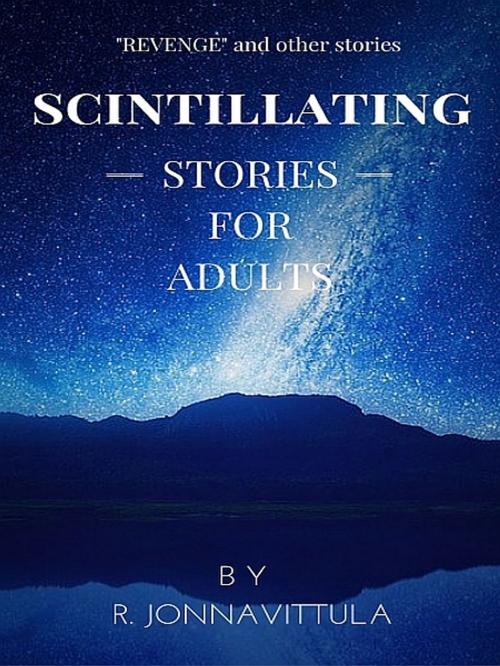| Author: | R. Jonnavittula | ISBN: | 9783960284130 |
| Publisher: | XinXii-GD Publishing | Publication: | March 1, 2016 |
| Imprint: | Language: | English |
| Author: | R. Jonnavittula |
| ISBN: | 9783960284130 |
| Publisher: | XinXii-GD Publishing |
| Publication: | March 1, 2016 |
| Imprint: | |
| Language: | English |
I believe that fiction is an imaginative expression of truth; it follows that every truth can events and provoke a debate that tends to reform society. The author’s responsibility is to express himself in a language which does not offend a civilized society but one which causes it to think and act.
Some of these stories might so surprise some readers, that the stories might appear more imaginary than imaginative. I can assure them that the basic element of such stories is true; they merely prove that truth is stranger than fiction.
Whether you agree with the author or not it is certainly educative. Authors have a knack of casting a spell on you and attracting you to their point of view. Readers should step off from the author from time to time and reexamine author’s logic critically and decide for themselves.
This is a collection of stories; therefore I am giving a brief idea of each story.
Revenge: A girl did not believe the story of the death of her sister as narrated by her brother-in-law. The girl married him, discovered the cause of her sister’s death and punished him.
Delayed punishment: An elderly person sexually abused a neighborhood poor girl of tender age as well as his own niece of the same age. The girls meet after their marriages and punish the culprit.
A body’s lapse: Unable to withstand prolonged separation with her husband who went on active war duty, the wife had sex with his brother, although she loved her husband ardently. As soon as she learned that her husband was returning soon, she abandoned his brother telling him that she used him merely as a medicine.
Mutual consent: An accident revealed that a Bank Manager had also been suffering from BP and diabetics and that he had to be under lifelong medication. His wife convinced a bank clerk to share life with her and her two children; she and her husband agreed to separate under that arrangement.
Dramatic restoration: After reading the first few pages of a book a person began suspecting his wife; unable to suffer the humiliation, she attempted suicide but was saved by mutual friends. They restore her to her husband dramayically.
Confession: An actor and brother of an MLA killed a person accidentally. The MLA influenced the police and got a beggar arrested for the crime. The actor surrendered to the police and got the beggar released.
Jai Jagannadh! Adolescent infatuation brought a girl to a religious celebration of God Jagannadha. After marriage, she entirely dropped her adolescent affair from her memory.
Asoka: After winning the Kalinga war, Asoka punished the surviving rebels cruelly by throwing them one by one into a cauldron containing boiling oil! When a Buddhist monk was thrown in, he surfaced unaffected and meditating in Padmasana.
Sabari’s new version: A person remained faithful to his promise, irrespective of its absurdity.
Stranger than fiction: For a girl under a strong sexual urge bordering on frenzy, death of her father earlier in the day did not seem to matter!
Example of the elders: A girl saw her widowed mother having sex with another person; both were enjoying it. Unable to understand what they were doing, she tried and did the same with her friend.
What a family: A mother overlooked serious lapses of her children but was cruel towards her daughters-in-law.
The red ribbon: Two friends went on a sight-seeing trip. One of them was on a chase for women of easy virtue. One such person met and tried to entice the other friend who felt that she was a victim of circumstances and offered to marry her. She understood his naivety and left him before he woke up.
Some of these stories might so surprise some readers, that the stories might appear more imaginary than imaginative. I can assure them that the basic element of such stories is true; they merely prove that truth is stranger than fiction.
Whether you agree with the author or not it is certainly educative. Authors have a knack of casting a spell on you and attracting you to their point of view. Readers should step off from the author from time to time and reexamine author’s logic critically and decide for themselves.
This is a collection of stories; therefore I am giving a brief idea of each story.
Revenge: A girl did not believe the story of the death of her sister as narrated by her brother-in-law. The girl married him, discovered the cause of her sister’s death and punished him.
Delayed punishment: An elderly person sexually abused a neighborhood poor girl of tender age as well as his own niece of the same age. The girls meet after their marriages and punish the culprit.
A body’s lapse: Unable to withstand prolonged separation with her husband who went on active war duty, the wife had sex with his brother, although she loved her husband ardently. As soon as she learned that her husband was returning soon, she abandoned his brother telling him that she used him merely as a medicine.
Mutual consent: An accident revealed that a Bank Manager had also been suffering from BP and diabetics and that he had to be under lifelong medication. His wife convinced a bank clerk to share life with her and her two children; she and her husband agreed to separate under that arrangement.
Dramatic restoration: After reading the first few pages of a book a person began suspecting his wife; unable to suffer the humiliation, she attempted suicide but was saved by mutual friends. They restore her to her husband dramayically.
Confession: An actor and brother of an MLA killed a person accidentally. The MLA influenced the police and got a beggar arrested for the crime. The actor surrendered to the police and got the beggar released.
Jai Jagannadh! Adolescent infatuation brought a girl to a religious celebration of God Jagannadha. After marriage, she entirely dropped her adolescent affair from her memory.
Asoka: After winning the Kalinga war, Asoka punished the surviving rebels cruelly by throwing them one by one into a cauldron containing boiling oil! When a Buddhist monk was thrown in, he surfaced unaffected and meditating in Padmasana.
Sabari’s new version: A person remained faithful to his promise, irrespective of its absurdity.
Stranger than fiction: For a girl under a strong sexual urge bordering on frenzy, death of her father earlier in the day did not seem to matter!
Example of the elders: A girl saw her widowed mother having sex with another person; both were enjoying it. Unable to understand what they were doing, she tried and did the same with her friend.
What a family: A mother overlooked serious lapses of her children but was cruel towards her daughters-in-law.
The red ribbon: Two friends went on a sight-seeing trip. One of them was on a chase for women of easy virtue. One such person met and tried to entice the other friend who felt that she was a victim of circumstances and offered to marry her. She understood his naivety and left him before he woke up.
I believe that fiction is an imaginative expression of truth; it follows that every truth can events and provoke a debate that tends to reform society. The author’s responsibility is to express himself in a language which does not offend a civilized society but one which causes it to think and act.
Some of these stories might so surprise some readers, that the stories might appear more imaginary than imaginative. I can assure them that the basic element of such stories is true; they merely prove that truth is stranger than fiction.
Whether you agree with the author or not it is certainly educative. Authors have a knack of casting a spell on you and attracting you to their point of view. Readers should step off from the author from time to time and reexamine author’s logic critically and decide for themselves.
This is a collection of stories; therefore I am giving a brief idea of each story.
Revenge: A girl did not believe the story of the death of her sister as narrated by her brother-in-law. The girl married him, discovered the cause of her sister’s death and punished him.
Delayed punishment: An elderly person sexually abused a neighborhood poor girl of tender age as well as his own niece of the same age. The girls meet after their marriages and punish the culprit.
A body’s lapse: Unable to withstand prolonged separation with her husband who went on active war duty, the wife had sex with his brother, although she loved her husband ardently. As soon as she learned that her husband was returning soon, she abandoned his brother telling him that she used him merely as a medicine.
Mutual consent: An accident revealed that a Bank Manager had also been suffering from BP and diabetics and that he had to be under lifelong medication. His wife convinced a bank clerk to share life with her and her two children; she and her husband agreed to separate under that arrangement.
Dramatic restoration: After reading the first few pages of a book a person began suspecting his wife; unable to suffer the humiliation, she attempted suicide but was saved by mutual friends. They restore her to her husband dramayically.
Confession: An actor and brother of an MLA killed a person accidentally. The MLA influenced the police and got a beggar arrested for the crime. The actor surrendered to the police and got the beggar released.
Jai Jagannadh! Adolescent infatuation brought a girl to a religious celebration of God Jagannadha. After marriage, she entirely dropped her adolescent affair from her memory.
Asoka: After winning the Kalinga war, Asoka punished the surviving rebels cruelly by throwing them one by one into a cauldron containing boiling oil! When a Buddhist monk was thrown in, he surfaced unaffected and meditating in Padmasana.
Sabari’s new version: A person remained faithful to his promise, irrespective of its absurdity.
Stranger than fiction: For a girl under a strong sexual urge bordering on frenzy, death of her father earlier in the day did not seem to matter!
Example of the elders: A girl saw her widowed mother having sex with another person; both were enjoying it. Unable to understand what they were doing, she tried and did the same with her friend.
What a family: A mother overlooked serious lapses of her children but was cruel towards her daughters-in-law.
The red ribbon: Two friends went on a sight-seeing trip. One of them was on a chase for women of easy virtue. One such person met and tried to entice the other friend who felt that she was a victim of circumstances and offered to marry her. She understood his naivety and left him before he woke up.
Some of these stories might so surprise some readers, that the stories might appear more imaginary than imaginative. I can assure them that the basic element of such stories is true; they merely prove that truth is stranger than fiction.
Whether you agree with the author or not it is certainly educative. Authors have a knack of casting a spell on you and attracting you to their point of view. Readers should step off from the author from time to time and reexamine author’s logic critically and decide for themselves.
This is a collection of stories; therefore I am giving a brief idea of each story.
Revenge: A girl did not believe the story of the death of her sister as narrated by her brother-in-law. The girl married him, discovered the cause of her sister’s death and punished him.
Delayed punishment: An elderly person sexually abused a neighborhood poor girl of tender age as well as his own niece of the same age. The girls meet after their marriages and punish the culprit.
A body’s lapse: Unable to withstand prolonged separation with her husband who went on active war duty, the wife had sex with his brother, although she loved her husband ardently. As soon as she learned that her husband was returning soon, she abandoned his brother telling him that she used him merely as a medicine.
Mutual consent: An accident revealed that a Bank Manager had also been suffering from BP and diabetics and that he had to be under lifelong medication. His wife convinced a bank clerk to share life with her and her two children; she and her husband agreed to separate under that arrangement.
Dramatic restoration: After reading the first few pages of a book a person began suspecting his wife; unable to suffer the humiliation, she attempted suicide but was saved by mutual friends. They restore her to her husband dramayically.
Confession: An actor and brother of an MLA killed a person accidentally. The MLA influenced the police and got a beggar arrested for the crime. The actor surrendered to the police and got the beggar released.
Jai Jagannadh! Adolescent infatuation brought a girl to a religious celebration of God Jagannadha. After marriage, she entirely dropped her adolescent affair from her memory.
Asoka: After winning the Kalinga war, Asoka punished the surviving rebels cruelly by throwing them one by one into a cauldron containing boiling oil! When a Buddhist monk was thrown in, he surfaced unaffected and meditating in Padmasana.
Sabari’s new version: A person remained faithful to his promise, irrespective of its absurdity.
Stranger than fiction: For a girl under a strong sexual urge bordering on frenzy, death of her father earlier in the day did not seem to matter!
Example of the elders: A girl saw her widowed mother having sex with another person; both were enjoying it. Unable to understand what they were doing, she tried and did the same with her friend.
What a family: A mother overlooked serious lapses of her children but was cruel towards her daughters-in-law.
The red ribbon: Two friends went on a sight-seeing trip. One of them was on a chase for women of easy virtue. One such person met and tried to entice the other friend who felt that she was a victim of circumstances and offered to marry her. She understood his naivety and left him before he woke up.















